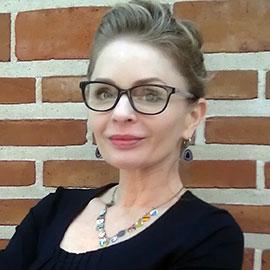The Ken Kennedy Institute's September Member of the Month, Dr. Cymene Howe, is Professor and Director of Graduate Studies in the Department of Anthropology. She is also a faculty member with the Center for the Study of Women, Gender, and Sexuality.
Dr. Howe's research is concerned with the ways that ecological authority is constituted as well as how anthropogenic climate change calls for new ways of imagining our collective biotic and material futures. She also has a longstanding interest in the overlapping conversations between feminist and queer theory, new materialisms and more-than-human being.
She is currently researching the social life of ice in the Arctic and, specifically, in the country of Iceland. This project examines the social and political significance of ice, the values associated with it, and the implications of its expiration; it is an inquiry into the social sentiments and consequences of melt and the metamorphosis of ice. In the most basic terms it is a study of cryohuman relations.
Her first book, Intimate Activism: The Struggle for Sexual Rights in Postrevolutionary Nicaragua, analyzes how sexual rights activists reformulated their country's revolutionary history to create new models of sexual subjectivity and rights. Her second book, Ecologics: Wind and Power in the Anthropocene, is based on a collaborative research project (with Dominic Boyer) in Oaxaca, Mexico and focuses on the political and social contingencies of renewable energy development. Ecologics proposes that while energy transition demands the adoption of less catastrophic fuel sources, equally critical is knowing the ways that humans articulate energetic desires—for light and heat, movement and flourishing—and how these correspond with or disrupt the energetic needs of other biotic life and ecological systems.
What is your favorite book?
An impossible question! But this one is in the top three:
Meeting the Universe Halfway: Quantum Physics and the Entanglement of Matter and Meaning, by Karen Barad
How do you explain your research in one sentence?
I research the human dimensions of climate change adaptation and the people's dynamic responses to environmental shifts in social, cultural and political systems.
What is your favorite aspect of your research?
The best part of my research consists of talking with interesting people about things they care about, then applying analytic interpretations of these dialogues. Normally, I travel around the world to do so, but for now, I am waiting to head back to the Arctic region, then onto South Africa and and Polynesia.
What challenges do you see in your research that you didn't expect?
The pandemic has put serious restraints on in-person research for now. More generally, collaboration between disciplines is critical but not always easily done either because of institutional or funding barriers.
How do you see computation and data advancing in the future?
The human sciences have been actively cultivating inquiries into algorithms, data and the interface between computational systems and human behaviors and manners of thought. Hopefully, innovative ways of visualizing or representing data in accessible forms will continue to be robust.

